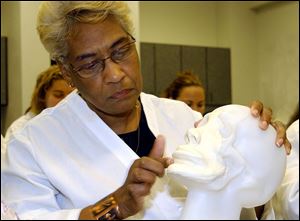
More women enter funeral professions
8/2/2004
Voncille Oliver began her studies at the Pittsburgh Institute of Mortuary Science after retiring from the airline industry.
Hospital supervisor Carol Smith needed to be home more with two ill sons, so she turned to a career as the director of a funeral home.
Ms. Smith, 38, of Cleveland has more flexibility with work hours to care for a son with a heart condition and the other in a wheelchair with full-body arthritis.
She represents a national trend. Women made up 52 percent of all students entering mortuary schools and other funeral education programs in 2003. That's up from 5 percent in 1971, according to the American Board of Funeral Service Education.
Voncille Oliver fell into part-time jobs driving limousines and hearses for two Cleveland funeral homes after retiring from United Airlines in 2000. "I was just hooked after that," she said, a student at the nonprofit Pittsburgh Institute of Mortuary Science.
"It's hard work emotionally and physically, that's true," she said. "But it's such an enriching profession, when you're talking to the families - especially the older women who've been married 50, 60 years - to be able to sit down and talk and make them laugh, it makes you feel good."
Women are working in all aspects of the business, including preplanning, embalming, and arranging services.
In the Toledo area, there are at least 10 female funeral directors, and wives of funeral directors in rural areas of northwest Ohio have become licensed to assist them, said Keith Walker, president of Walker Funeral Home in Sylvania Township and secretary of the Ohio Funeral Directors Association.
Generations of women have been funeral directors at Foth Dorfmeyer Mortuary in Toledo, a family business established in 1892. Women traditionally have become funeral directors because of family businesses, but some without those ties are choosing the profession, said Susan Dorfmeyer Strup, president.
Gene Ogrodnik, president of the Pittsburgh mortuary institute, which sends about 10 percent of its graduates to jobs in Ohio, said women tend to be better communicators than men in the profession.
"The rapport they establish with the client family is, in my opinion, certainly more solid than a male can do," he said.
Some women see it as a calling, a way to help people through one of the hardest times in their lives. And then there are those, like Ms. Smith, who said evening and weekend hours make their family lives more manageable.
There are predictions that the industry will suffer from a shortage of funeral home directors as baby boomers age and start dying. Like Ms. Smith, more people are choosing funeral work as a second career. Many are enrolling in mortuary schools in their 30s, 40s, and 50s, after retiring or being laid off from other jobs.
Last year, 31 percent of new students were older than 30, up from 26 percent in 1995, the funeral education board said.